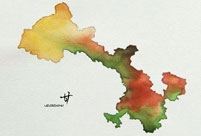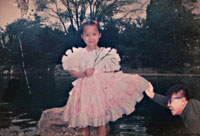 Motorcycle stunt on the Bund
Motorcycle stunt on the Bund
 French Spiderman Alain Robert climbs up Galaxy Hotel in Macao
French Spiderman Alain Robert climbs up Galaxy Hotel in Macao
 Africans in Guangzhou
Africans in Guangzhou
 Pole dancer shows strength and beauty up in the air
Pole dancer shows strength and beauty up in the air
 College girls call for protection of ecological space on earth
College girls call for protection of ecological space on earth
 Top 10 celebrities driving auto brands
Top 10 celebrities driving auto brands
 10 low-carbon tips to save money
10 low-carbon tips to save money
 Luxury cars make Asia premiere at Auto China
Luxury cars make Asia premiere at Auto China
 Versatile dog
Versatile dog
 Ni Ni covers BAZAAR JEWELRY
Ni Ni covers BAZAAR JEWELRY
Newly revealed documents show that atrocities committed by Japanese invaders during WWII not only brought disaster to Chinese people, but also were inflicted on people from North Korea, Indonesia, the UK and the US in China, said archive authorities in Jilin Province Monday.
The documents were among 89 wartime files released by Jilin Provincial Archives Friday. This includes letters between Japanese soldiers, reports by Japanese newspapers and Japan's military forces.
The 89 documents, previously kept by the police corps of Japan's Kwantung Army and national bank of the then puppet Manchurian regime in Changchun provided details of the Nanjing Massacre, sex slaves used by the Japanese military and activities of Japanese Army Unit 731.
There is evidence that North Koreans were victims of bacterial warfare in China and that American and British prisoners of war were maltreated.
A North Korean man accused of spying was transferred to Unit 731 in Harbin, Heilongjiang Province, where bacterial experiments on humans were carried out, one of the 89 documents said.
Three of the 89 documents showed that the British and American prisoners were sent to Shenyang, Liaoning Province from 1942 to 1945, where they were used as forced labor in Japanese factories and maltreated.
"Asian countries have paid attention to these historical facts but European countries and the US did not and this should be changed," said Jiang Lifeng, former head of the Institute of Japanese Studies at the Chinese Academy of Social Sciences.
Jiang said that Japan has in recent years shown a "dangerous tendency of militarism" and the whole world, including the US, should notice that.
Another document, a monthly report of invading troops in Java, Indonesia, recorded that one solider from the police corps was criticized for visiting a local "comfort station" in 1944.
"Forcing women to become sex slaves was a 'mechanism' of the Japanese military at that time and such a system spread to wherever they reached," said Su Zhiliang, a Shanghai Normal University professor who specializes in the history of "comfort women."
The 89 files represent just a very small proportion of the 100,000 files in the provincial archives and more will be made public to remind the world, especially right-wing politicians in Japan who try to deny Japan's wartime crimes, to face their history, said Mu Zhanyi, curator of the Jilin Provincial Archives on Monday.
Mu said that releasing the files is not only to remember history, but for keeping the peace and preventing war from breaking out again.
The files were buried by the invading troops when fleeing Changchun in the wake of war with the Soviet Union, as they had no time to burn all the documents. They were then dug up during construction in 1953.
Translating the documents that were mostly written in ancient Japanese was the most difficult part, said Zhao Yujie, research fellow with the provincial archive of Jilin, adding that is why it took such a long time for them to publish the findings.
So far there is no plan to invite Japanese experts to participate in the project, said Mu.
 Hand-painted maps go viral online; painter's name remains unknown
Hand-painted maps go viral online; painter's name remains unknown 4th Beijing Int'l Film Festival ends
4th Beijing Int'l Film Festival ends Commando elite specializes in sign language
Commando elite specializes in sign language Man photoshops himself into girlfriend's childhood photos
Man photoshops himself into girlfriend's childhood photos Photo story: Stallholders at Beijing Zoo Wholesale Market
Photo story: Stallholders at Beijing Zoo Wholesale Market Artists on backstage
Artists on backstage Beckham launches fund to support youth soccer in China
Beckham launches fund to support youth soccer in China Cherry blossoms hit peak bloom in Washington D.C.
Cherry blossoms hit peak bloom in Washington D.C. Children in ancient costumes learn Zhusuan
Children in ancient costumes learn Zhusuan Cute Shaolin boy melts the hearts of millions
Cute Shaolin boy melts the hearts of millions Giant panda Sijia is back to happy life
Giant panda Sijia is back to happy life Richest Chinese of 2014: half from the mainland
Richest Chinese of 2014: half from the mainland Chengdu - laid-back lifestyle makes happiest city
Chengdu - laid-back lifestyle makes happiest city The backstage of the Fashion Week
The backstage of the Fashion Week College students in Han costumes
College students in Han costumesDay|Week|Month